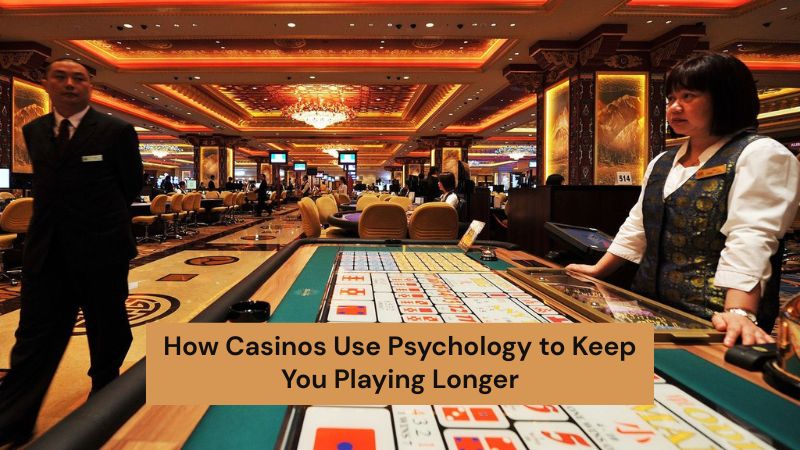Casinos are designed with one goal in mind: to keep you playing for as long as possible. They use a mix of psychology, design, and strategies to encourage players to stay engaged and keep betting. If you’ve ever wondered why you lose track of time or feel like you can’t walk away from a game, it’s no accident. Understanding how casinos use psychological tactics can help you make more informed choices and avoid falling into common traps.
In this post, we’ll explore some of the most common psychological tricks casinos use to keep you playing longer.
The “Near Miss” Effect
One of the most powerful psychological tricks used in casinos is the “near miss” effect. This happens when you almost win a game but fall just short. For example, when you’re playing a slot machine and see two matching symbols, with one more just about to land in the next spot. It feels like you were close, which gives you a boost of excitement and motivates you to keep playing.
Why it works: The near miss effect creates a sense of hope and encourages players to keep going, even after they’ve lost. It tricks your brain into thinking you’re almost there, making you more likely to continue gambling. In reality, the outcome is just as random as any other spin, but your brain perceives it as a sign of “success” just within reach.
Constant Stimulation: Lights, Sounds, and Colors
Casinos are full of bright lights, flashing signs, and sounds that are carefully designed to keep you stimulated. When you hit a small win, the machine often lights up, plays loud celebratory music, and flashes bright colors. This constant sensory input creates an environment that keeps you alert and engaged.
Why it works: The stimulation is meant to keep your brain active and excited. Loud sounds and flashing lights trigger the release of dopamine, the “feel-good” chemical in the brain, which makes you feel rewarded and encourages you to keep playing. Even if you’re losing, the occasional burst of noise or light can make you feel like you’re winning, increasing the chances of continued play.
The Illusion of Control
Many casino games give players a false sense of control, especially in games like blackjack or poker. In these games, players make decisions about when to hit, stand, or bet, which can create the illusion that they have some control over the outcome. This feeling can keep players at the table longer, as they believe their choices affect the results.
Why it works: When people feel like they’re in control, they are more likely to stay engaged and keep playing. This sense of control makes the game more exciting and emotionally involving, even though, in reality, most casino games are based on chance. The illusion of control helps players justify their decisions and continue making bets, thinking that their next move could be the one that wins big.
The “Free” Drinks and Comps
Casinos often offer “free” drinks, meals, or even hotel stays to keep you playing longer. While these perks may seem like a great deal, they are carefully calculated tactics designed to increase your spending. When you’re drinking, you’re less likely to make rational decisions, and you’re more inclined to keep playing.
Why it works: Alcohol reduces your inhibitions and makes you more willing to take risks. It can also alter your perception of time, making you less aware of how long you’ve been gambling. By offering free drinks or comps, casinos are encouraging you to play for longer periods without feeling the impact of your spending.
The “Losses Disguised as Wins” Strategy
Have you ever experienced a situation where you lost money but the machine or dealer celebrated as though you won? This is a common tactic used in slot machines and table games, where small wins or even the return of some of your lost money is celebrated. It’s a way to keep you in the game without making you feel defeated.
Why it works: Casinos use this strategy to keep you feeling positive and hopeful. By celebrating small wins (even if you’re still at a loss overall), your brain releases dopamine, making you feel like you’re on the right track. This encourages you to keep playing, thinking you’re getting closer to a big win, even when you’re actually losing money.
The Design of the Casino Floor
Casinos are specifically designed to keep you inside for as long as possible. There are no clocks, no windows, and the layout is designed to make it hard to find your way out. The goal is to disorient you and prevent you from realizing how much time has passed.
Why it works: Without the ability to check the time or see the outside world, players are less likely to feel the urge to leave. The design is intended to make you lose track of time and stay engaged with the games. The layout is also created to direct traffic toward certain areas, encouraging players to walk by more games, keeping them in the casino longer.
The Use of Rewards and Loyalty Programs
Casinos offer rewards programs to keep players coming back. These programs track your play and offer rewards such as free play, meals, or even cash back. The more you play, the more points you earn, which encourages you to keep gambling to reach the next reward level.
Why it works: Loyalty programs tap into the psychology of “earning” rewards. Players may feel like they’re working toward something valuable, even though the rewards may not be worth the money they spend. The sense of earning something keeps players engaged, even when they’re losing money.
Social Influence: Group Play and Peer Pressure
Casinos are often busy and social places, where players interact with each other and feed off one another’s energy. Group play, especially in games like poker or craps, creates a sense of camaraderie and excitement. Peer pressure can also play a role, as players may feel the urge to keep going when others around them are continuing to gamble.
Why it works: Humans are social creatures, and the desire to fit in or belong to a group can be a powerful motivator. When everyone around you is playing, it can make you feel like you should continue, too. This social influence can increase your willingness to take risks and keep playing longer.
Conclusion
Casinos are experts at using psychology to keep you engaged and playing for longer periods of time. From the near miss effect to the use of sensory stimulation, they create an environment that encourages you to keep coming back for more. While understanding these tactics can help you be more aware of the strategies at play, it’s essential to gamble responsibly and set clear limits for yourself.
By knowing how casinos use psychology to influence your behavior, you can make more informed choices and enjoy the casino experience on your terms.










